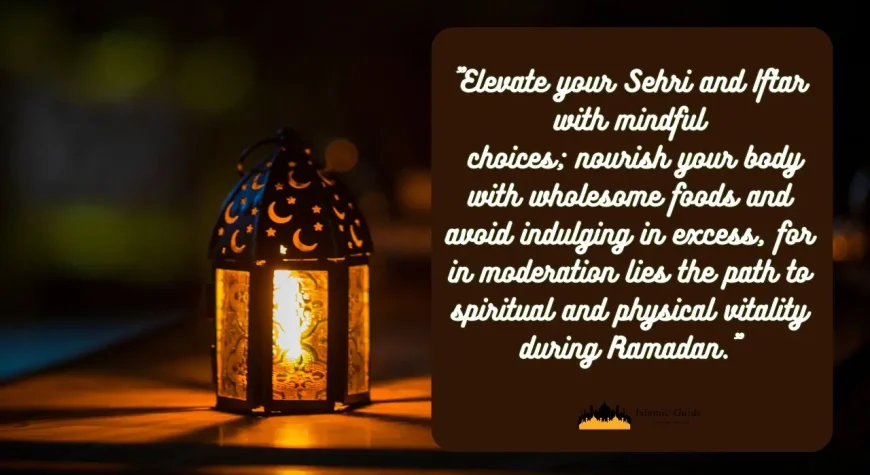What to Eat (and Avoid) During Ramadan’s Sehri and Iftar

Ramadan, a holy month for Muslims worldwide, is a time for spiritual reflection, self-sacrifice, and community. But it’s also a month of delicious meals! This guide will explore what to eat (and avoid) during Ramadan’s two important meals: Sehri (pre-dawn meal) and Iftar (evening meal after breaking the fast).
Understanding Your Body’s Needs During Ramadan
During Ramadan, your eating and sleeping patterns change completely. To stay energized and healthy throughout the day, focus on consuming foods rich in:
- Protein: Builds and repairs muscle tissues.
- Complex Carbohydrates: Provide sustained energy release.
- Vitamins and Minerals: Essential for overall health and well-being.
- Hydration: Crucial to avoid dehydration, especially during hot weather.
Sehri: The Pre-Dawn Fueling Station
Sehri is your chance to prepare your body for a long day of fasting. Here’s what to include and avoid for a successful Sehri:
Embrace These Energizing Foods:
- Complex Carbohydrates: Opt for whole grains like oats, barley, and whole-wheat bread. These release energy slowly, keeping you feeling full for longer.
- Protein Powerhouses: Include eggs, lean meats, fish, legumes (beans and lentils), and dairy products (yogurt, milk, cheese) in your meal. Protein helps maintain muscle mass and keeps you satisfied.
- Healthy Fats: Don’t skip healthy fats! Nuts, seeds, avocado, and olive oil provide essential fatty acids that regulate hunger and keep you energized.
- Hydration Essentials: Drink plenty of water and hydrating fluids like coconut water, herbal teas, or diluted fruit juices. This helps prevent dehydration throughout the day.
Foods to Leave on the Plate:
- Sugar Rush Culprits: Avoid sugary foods and drinks like pastries, sweets, and carbonated beverages. These cause blood sugar spikes followed by energy crashes later in the day.
- Spicy Distractions: Limit highly spiced foods as they can increase thirst and discomfort during fasting hours.
- Greasy Troublemakers: Fried and greasy foods like samosas and pakoras are heavy on the stomach and can lead to indigestion. Opt for lighter options.
- Dehydration Disguises: Minimize caffeine and stimulants like coffee, tea, and energy drinks. These can increase urine production and dehydrate you.
- Processed Food Blues: Skip processed and packaged foods that are often high in unhealthy fats, salt, and additives. Choose whole, natural foods whenever possible.
Iftar: Breaking the Fast with Joy

plates filled with foods and fruits for iftar eating
Iftar is a joyous occasion to break your fast and share a meal with loved ones. Here are some healthy and delicious Iftar meal ideas:
Foods to Celebrate With:
- Date Delight: Start your Iftar with dates and water, following the tradition of Prophet Muhammad (peace be upon him). Dates are a natural source of energy and help rehydrate your body.
- Nutrient-Rich Snacks: Choose nutritious snacks like fruits, nuts, and yogurt to replenish energy levels after a long day.
- Souper Start: Have a light soup with vegetables or lentils to gently rehydrate and nourish your body.
- Protein Power: Include protein-rich options like grilled chicken, fish, or beans to rebuild muscle tissues broken down during fasting.
- Complex Carbohydrate Choices: Brown rice, whole grains, and sweet potatoes are excellent sources of complex carbohydrates that provide sustained energy.
- Veggie Variety: Don’t forget the veggies! Include a variety of cooked or raw vegetables in your Iftar meal for essential vitamins, minerals, and fiber.
- Hydration Heroes: Continue prioritizing water and hydrating fluids to replenish lost fluids during the day.
Foods to Minimize:
- Fried Food Foes: Avoid fried and greasy foods, as they can cause indigestion and discomfort, especially after a long fast.
- Sugar Crash Culprits: Limit sugary snacks and desserts as they can cause spikes in blood sugar levels, leading to a crash later.
- Overindulgence Trap: Avoid overeating, as it can lead to bloating and digestive issues. Listen to your body’s hunger cues and eat mindfully.
- Processed Food Pitfalls: Limit processed and packaged foods, which may be high in unhealthy fats and additives. Choose fresh, whole foods for optimal health benefits.
- Caffeine Confusion: Avoid caffeine-containing beverages like coffee and tea close to bedtime, as they can disrupt your sleep patterns.
- Salty Surprise: Limit foods high in salt, as they can contribute to dehydration. Opt for naturally flavorful options.
- Carbonated Conundrum: Avoid carbonated drinks, as they can cause bloating and discomfort.
Practical Tips for a Healthy Ramadan: Beyond Food Choices
While food choices are essential for a healthy Ramadan, here are some additional tips to keep in mind:
Planning is Key:
- Meal Prep Magic: Prepping meals and snacks in advance can save you time and ensure you have healthy options readily available, especially during busy days.
- Hydration Hero: Keep a reusable water bottle with you throughout the day and set reminders to drink regularly.
Listen to Your Body:
- Fasting Flexibilities: If you have any underlying health conditions, consult your doctor before fasting. Pregnant, breastfeeding, and menstruating women are often exempt from fasting.
- Rest and Relaxation: Prioritize getting enough sleep during Ramadan. Aim for 7-8 hours of quality sleep each night.
- Mindful Movement: Engage in light exercise during non-fasting hours to maintain energy levels and overall well-being.
The Spirit of Ramadan:
- Community Connection: Ramadan is a time for strengthening community bonds. Share meals with loved ones, volunteer your time, and participate in community prayers (Taraweeh).
- Spiritual Reflection: Use this time for increased prayer, reading the Quran, and acts of charity (Zakat).
Remember:
Ramadan is a time for spiritual growth and self-reflection. By making healthy choices, planning effectively, and listening to your body, you can have a fulfilling and enriching Ramadan experience.

